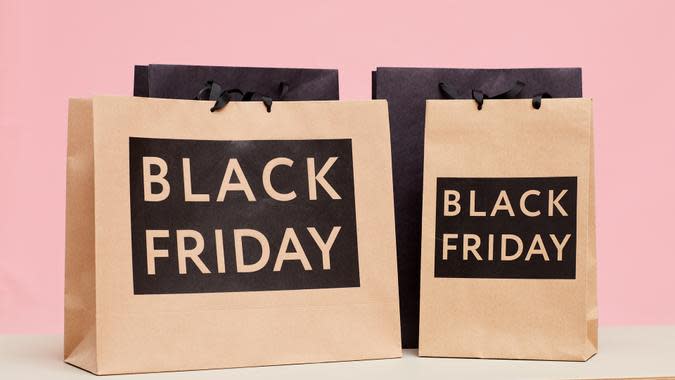7 Consumer Trends That Will Dominate This Year’s Christmas Shopping

Are you dreaming of a...slower Christmas shopping season? The National Retail Federation (NRF) sure is predicting one.
According to the AP News, "the nation's largest retail trade group, expects holiday sales growth will slow to a range of 6% to 8%, compared with the blistering 13.5% growth of a year ago." That's a huge shift from the last ten years where holiday spending in the United States went up by an average of 4.9%, especially during the online spending boom during the pandemic.
Also: Surprising Things You Can Buy With Food Stamps
Check Out: If Your Credit Score Is Under 740, Make These 4 Moves Now
Though holiday shopping is anticipated to be down, that doesn't mean all consumers will be saving up their hard-earned cash for a rainy day instead of a snowy one. Still, smart spending never goes out of style.
Beyond how much they'll be spending, how will consumers spend and on what? What are their values, desires and objectives? Here's a look at 7 major trends that will dominate Christmas shopping this year.

1. Most Shopping Will Happen Online
The consumer predilection for online shopping was burgeoning well before COVID-19 was a concern, but the pandemic turned the growing interest in e-commerce into a here-to-stay phenomenon.
According to Forbes: "Early discounting and economic uncertainty have caused e-commerce to stall, so even though online is still crucial, it lags behind growth in previous years."
While spending overall is expected to drop, internet sales this holiday season are predicted to increase by 2.5%.

2. Smarter Bargain Hunters
As retailers get craftier with how they market and sell online, that just means consumers are starting to get savvier with when and where they purchase what's on their lists. The NRF notes discounts and sales are what's driving holiday shoppers this year. 58% told the NRF that they're cautiously scanning for any and all available promotions during the 2022 gift buying season, which is up 10% from last year.
"While Black Friday itself may not hold the appeal it once did--in 2015, 60% of consumers told us they would shop on Black Friday," states a report by PWC, "This year, 20% said they would-- the end of November does signal holiday shopping in the minds of consumers. Meanwhile, a scant 17% will wait until after the Thanksgiving weekend."
Take Our Poll: What's the First Thing You Would Do If You Won a Big Lottery Jackpot?

3. Better Customer Service
While tracking down gifts online continues to be a pursuit consumers can complete in solitude, other parts of the holiday shopping experience are transforming to be more human-based. Specifically, customer service.
Business Wire reports that in a national survey, conducted by OnePoll and commissioned by TCN, "66% of Americans are likely to abandon a brand after a poor customer service experience. This is a significant jump compared to only 42% in the 2021 survey. When asked how likely they were to abandon a brand after poor experiences, 27% said "very likely," up from 16% last year, and 39% said "somewhat likely," up from 25% last year."
"The results really drive home the importance of positive customer service and its significant impact on brand loyalty," TCN Marketing Director, McKay Bird remarked. Bird commented that the 2022 survey shows significantly upward trending changes contact centers have made in terms of progress during interactions between their customers and service agents.

4. The Gift Buying Season Will Be Longer...And Longer...
While deals were already starting to pop up in October, including Amazon's second Prime Day, retailer's are trying to match shoppers by making dollars and time stretch.
74% of consumers are waiting for the best deals before they begin shopping, which they don't expect to see until November. Some (25%) will start shopping in early November; however, most (41%) will wait for the Thursday through Monday of Thanksgiving weekend to do the majority of their holiday shopping," states a report by PWC.

5. Credit Will Continue To Be King
While financial advisors strongly caution against using credit cards--especially when it means digging yourself into debt--credit will be as popular as ever a payment option this season. Because of rising costs and surging inflation, holiday shoppers are likely to spend more than they like, charging the costs of gifts to their credit cards.
Industry Leaders note that one of the holiday spending trends of 2022 will be an upswing in the swiping of consumer's plastic. They explain that "rising costs have impacted holiday shopping with customers planning to use different ways to supplement their income, including savings, credit card debt, and selling assets."
"When you use debit, it's your own bank account on the line, and if you become the unfortunate victim of fraud, you might be waiting to get money back into your account, which could affect other financial obligations," said Nathan Grant, senior credit industry analyst, Credit Card Insider. "With credit cards, it's the issuer's money on the line, and there are stronger federal protections to help prevent further damage to your financial situation."

6. Brand Values = Customer Values
From buying locally sourced goods to being concerned about the impact of purchasing on climate change, consumers are starting to care more and more about what they buy. They are also increasingly asking brands to step up and reflect the same values when it comes to the consumer experience.
According to a survey from PWC, "88% of consumers said when a company earns their trust, it also earns a recommendation to friends and family."
Since 2020, more shoppers are demanding more transparency when it comes to buying products, keeping their loved ones' well-being in the forefront of their purchasing.
The events of 2020 lead to consumers linking trust with health and safety, so brand trust has become increasingly important in recent years.
The survey also found that "a remarkable 93% of them told us it is top of mind during holiday shopping, similar to last year's 92% and a striking increase over the 70% we've recorded in the years prior to the pandemic."

7. Less Trendy, More Personal
There's almost an obligation to get everyone in your life a gift during the holiday season, a nearly impossible task, even for the most expert shoppers out there. In 2022, the heart of gift giving will be not so much about what you get, but more about how and who you give to.
There are many dominating players in the market for personalized gift and this is where time-based competition comes into play," noted the Entrepreneur magazine. "For the last five years, the industry has quadrupled itself with an increase of 25 per cent and addition of new categories of gift items. As the global retailing market increases, the revenue of the industry is expected to reach $77 billion by the end of 2022."
Which means that this year, consumers are opting out of what's in vogue for everyday items that can be jazzed up or experiences that are one-of-a-kind.
More From GOBankingRates
Nicole Spector contributed to the reporting for this article.
This article originally appeared on GOBankingRates.com: 7 Consumer Trends That Will Dominate This Year’s Christmas Shopping

